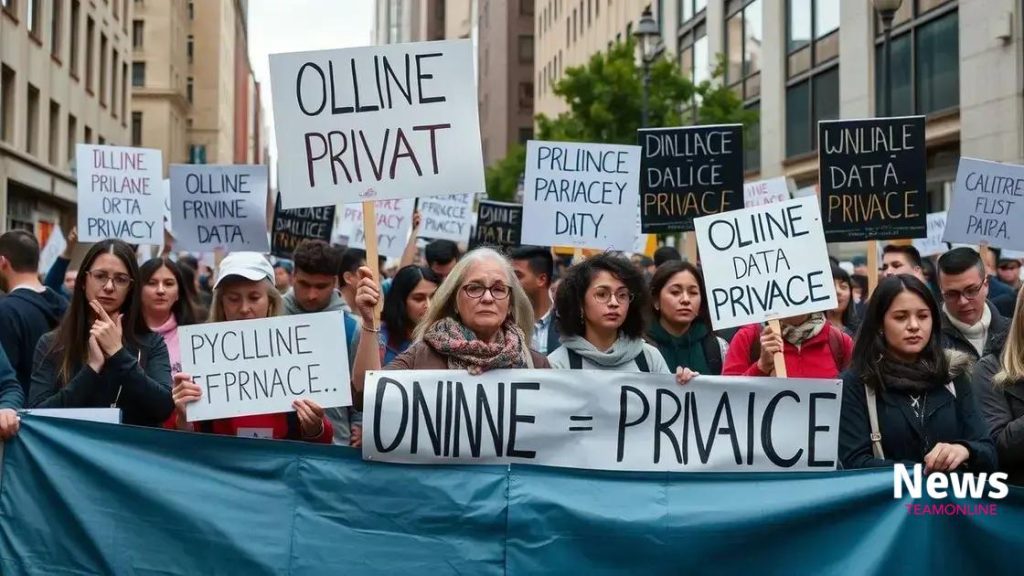Protests defending online data privacy grow across nations

Protests defending online data privacy are gaining momentum globally, fueled by demands for stronger regulations, technological innovations, and increased public awareness about personal data rights and security.
Protests defending online data privacy are becoming a hallmark of our digital age. As users become more aware of their data rights, these movements are shaping the landscape of digital privacy. Curious about how this affects you?
What sparked the recent protests?
Recent protests surrounding online data privacy highlight a growing concern among users worldwide. Many individuals are realizing the importance of protecting their personal information. These protests have emerged in response to various events that have raised awareness and urgency.
Key Events Leading to Protests
One of the significant triggers has been major data breaches affecting millions of people. High-profile incidents have shown just how vulnerable our information can be. Additionally, changes in legislation related to data collection have sparked outrage.
- The Cambridge Analytica scandal revealed how personal data can be misused.
- The enactment of the GDPR in Europe highlighted the need for privacy protections.
- Recent leaks from tech companies have shown a lack of transparency in data handling.
- Social media companies faced backlash for their role in data privacy issues.
Moreover, social media has played a transformative role. Platforms enable quick organization and mobilization, which makes it easier for individuals to join together in support of a common cause. The ability to share information rapidly increases awareness about data privacy rights and potential risks.
The Role of Activism
Activists have taken to the streets to demand clearer regulations and accountability from companies. Their messages often resonate with everyday citizens concerned about how their data is being stored and shared. When individuals see the implications of data misuse on their lives, they are more likely to participate in such movements against the erosion of online data privacy.
Key messages of the data privacy movements
The data privacy movements are driven by strong messages that resonate with many individuals concerned about their online safety. These messages emphasize the right to control personal information and demand transparency from companies that collect user data. As more people join the conversation, the key themes become even clearer.
Core Messages of the Movements
One of the primary messages is that every individual has a right to privacy. This belief underlines the need for regulations that protect personal data. Alongside this is the demand for greater transparency from technology companies. Users want to know how their information is being used and shared.
- Companies must be accountable for data breaches.
- Individuals should have the right to opt out of data collection.
- Users deserve clear and concise privacy policies.
- Informed consent is essential before any data is collected.
Additionally, the movements advocate for education on digital literacy. By understanding the risks involved in sharing personal information online, individuals can make more empowered decisions. The message is clear: users must be educated about their rights related to online privacy.
Collective Responsibility
Moreover, these movements highlight the collective responsibility of society. Everyone plays a role in pushing for better data privacy practices. Individuals can support legislation aimed at data protection and amplify the messages through social media. This collaboration creates a louder voice that demands change from policymakers.
Global responses to online privacy issues

Global responses to online privacy issues are manifesting in various ways, as nations recognize the importance of protecting citizens’ data. Countries around the world are stepping up to create regulations that address these concerns. Many governments are now prioritizing the drafting of laws that safeguard personal data.
Legislative Actions
In Europe, the General Data Protection Regulation (GDPR) set a high standard for privacy laws that many other regions are starting to emulate. It emphasizes the rights of individuals and imposes strict penalties on organizations that fail to comply.
- Countries in the European Union have adopted similar measures, showing a collaborative effort.
- In the United States, some states like California have introduced the California Consumer Privacy Act (CCPA) to enhance consumer rights.
- Countries like Brazil have enacted the Lei Geral de Proteção de Dados (LGPD), which mirrors GDPR principles.
- Global cooperation is also evident in discussions at international forums focusing on digital rights.
Such regulations are not merely bureaucratic. They reflect a growing public demand for accountability from tech companies regarding how they manage user data. Citizens are increasingly aware of their rights and the potential risks of information misuse, leading to higher expectations from their governments.
Technological Innovations
In response to privacy issues, technological innovations are emerging. Companies are developing tools to enhance data security, such as end-to-end encryption and decentralized applications. These innovations aim to give users more control over their personal information and help protect against unauthorized access. As these technologies evolve, they also contribute to shaping public policy.
Furthermore, many organizations are actively advocating for stronger protections and providing resources to help individuals understand their rights. This growing network of support is essential in fostering a culture of data privacy awareness.
The impact of social media on privacy protests
The impact of social media on privacy protests is profound and far-reaching. Social media platforms have become essential tools for organizing and amplifying voices concerned about data privacy. Through these channels, individuals can share information rapidly and mobilize support for their causes.
Mobilization and Awareness
Social media allows for quick mobilization of protests. Activists can create events and invite others to join them, making it easier to raise awareness about privacy violations. Platforms like Twitter and Facebook serve as forums where users discuss incidents related to data breaches. These conversations can spread swiftly, turning local issues into global movements.
- Hashtags like #PrivacyMatters help unify efforts across different regions.
- Influencers and thought leaders amplify key messages, reaching wider audiences.
- Visual content like videos and infographics simplifies complex issues, making them more accessible.
Furthermore, social media fosters a sense of community among participants. When individuals see others engaging in advocacy, it encourages more people to join in and share their experiences. Personal stories resonate well, highlighting the real-world impacts of privacy violations and motivating action.
Challenges and Misinformation
However, social media also presents challenges. Misinformation can spread just as quickly as important announcements. Misleading posts regarding privacy laws or protests can confuse individuals and dilute the messages of those fighting for data protection. It becomes crucial for protesters to verify information before sharing, ensuring that facts drive their advocacy.
Additionally, the algorithms used by social media platforms can hinder visibility. Content related to privacy protests might be buried or labeled incorrectly, making it hard for users to engage with the important issues. Thus, activists must employ strategic communication to ensure that their messages cut through the noise.
Future of online data privacy protections
The future of online data privacy protections is an essential topic as technology continues to evolve. As digital innovations occur, so do new threats to personal data. Therefore, enhanced privacy measures are becoming a priority for both individuals and organizations.
Emerging Legislation
New laws are being proposed worldwide to strengthen data protection. Many countries are inspired by frameworks like the GDPR, pushing for similar legislation. These laws aim to give users more control over their personal data and hold companies accountable for breaches.
- Regulations may require companies to be more transparent about data use.
- Individuals might have the right to request deletion of their data.
- Stricter penalties for data breaches could deter companies from neglecting user privacy.
As public awareness of data privacy grows, the demand for such regulations will likely intensify. Consumers are becoming more knowledgeable about their rights, leading to increased pressure on lawmakers.
Technological Solutions
Advances in technology will also play a vital role in enhancing privacy protections. Developers are creating sophisticated tools such as strong encryption methods to secure user data. These innovations allow individuals to safeguard their online activities more effectively.
Decentralized web technologies are emerging as an alternative to traditional models, offering users more control over their information. Blockchain technology, for example, presents opportunities for transparent data handling, where users have greater say in what happens to their data.
As companies adopt these technologies, we may see a shift in the approach to data privacy, placing more emphasis on user consent and autonomy.
The future of online data privacy protections is crucial as we advance into a more digital world. With increasing awareness and demand for privacy rights, governments and companies must prioritize new regulations and technologies that improve data security. As technology evolves, users must remain informed and advocate for their rights to personal data protection. By working together, society can create a safer online environment for everyone.
FAQ – Frequently Asked Questions about Online Data Privacy Protections
What are the key rights individuals have regarding data privacy?
Individuals have the right to know how their data is used, request deletions, and be informed about data breaches involving their information.
How do new regulations affect companies?
New regulations require companies to be more transparent, prioritize user consent, and impose stricter penalties for violations.
What technologies are improving data privacy?
Technologies like encryption, blockchain, and decentralized applications are enhancing data security and giving users more control.
Why is public awareness important for data privacy?
Public awareness empowers individuals to advocate for their rights and hold companies accountable for their data handling practices.





